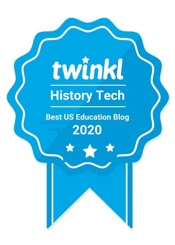Summer reading list 2018: Five books that will make me smarter

Long time History Tech readers already know this. Every summer, I make a list of books I plan to read between now and September. Long time History Tech readers also know this. Not once, not ever, a couple of times I came close but never ever, have I actually finished the list.
There’s always been something. I get distracted with a new book that comes out or some event happens that pulls me in a different direction. But some day . . . some day, it’s gonna happen. I’m trying to be realistic this year. Part of me says; yes, this summer it’s gonna happen – you’re going on a long anniversary trip to a tropical beach without the tech. Tons of time for book reading while sipping cool beverages under an umbrella.
The other part of me says; not a chance – as soon as you get home, the World Cup starts and the rest of June and part of July are shot to h, e, double hockey sticks. So we’ll see. (But it does help with the reading goal that the US team apparently forgot how to play the game and didn’t qualify, giving me less reason to watch. Go Iceland.)
The whole idea here got started moons ago when I first started teaching and some very smart people encouraged to not take the summers off. They’re the perfect time for learning, they said. Read a book, they said. Maybe two or more, they said.
So I did. And they were right. We need to keep learning, keep asking questions, keep moving forward. And what better time for that than between now and September? Some summers I start with a specific theme. This year? Not so much. Just a few books that look interesting or fun to read.
Here’s the 2018 list – fingers crossed:
 The End of Average: Unlocking Our Potential by Embracing What Makes Us Different
The End of Average: Unlocking Our Potential by Embracing What Makes Us Different
Are you above average? Is your child an A student? Is your employee an introvert or an extrovert? Every day we’re measured against the yardstick of averages, judged according to how closely we come to it or how far we deviate from it.
The assumption that metrics comparing us to an average – like GPAs, personality test results, and performance review ratings – reveal something meaningful about our potential is so ingrained in our consciousness that we don’t even question it. The author of The End of Average says that is spectacularly, even scientifically wrong and that no one is average. Not you. Not your kids. Not your employees.
But our entire school system was built on the idea that our kids are below, at, or above average. So this idea that everyone is different and that we can change how we do our jobs is intriguing.
 Blue Latitudes: Boldly Going Where Captain Cook Has Gone Before
Blue Latitudes: Boldly Going Where Captain Cook Has Gone Before
If you haven’t read any of Tony Horowitz’s books, what have you been doing with your life? Confederates in the Attic, A Voyage Long and Strange, Midnight Rising, Baghdad without a Map and Other Misadventures in Arabia, One for the Road. All awesome history / travel books that tell the stories of different times and places in a way that’s fun and contextual.
Two centuries after Captain James Cook’s epic voyages of discovery, Horwitz takes you on a trip across hemispheres and centuries to recapture the Captain’s adventures and explore his embattled legacy in today’s Pacific. In Blue Latitudes, he works as a sailor aboard a replica of Cook’s ship, meets island kings and beauty queens, and carouses the South Seas with a hilarious and disgraceful travel companion, an Aussie named Roger. This is the way all history books should be written.
 Rocket Men: The Daring Odyssey of Apollo 8 and the Astronauts Who Made Man’s First Journey to the Moon
Rocket Men: The Daring Odyssey of Apollo 8 and the Astronauts Who Made Man’s First Journey to the Moon
By August 1968, the American space program was in danger of failing in its two most important objectives: to land a man on the Moon by President Kennedy’s end-of-decade deadline and to triumph over the Soviets in space. With its back against the wall, NASA made an almost unimaginable leap: It would scrap its usual methodical approach and risk everything on a sudden launch, sending the first men in history to the Moon – in just four months.
Who doesn’t love astronauts? That’s right. We all do.
 Barracoon: The Story of the Last Black Cargo
Barracoon: The Story of the Last Black Cargo
In 1927, Zora Neale Hurston went to Plateau, Alabama to interview eighty-six-year-old Cudjo Lewis. Cudjo was the only person still alive able to tell the story of being transported via the Middle Passage from Africa to North America. Spending more than three months in Plateau, Hurston talked in depth with Cudjo and talked about his past – memories from his childhood in Africa, the horrors of being captured and held in a barracoon for selection by American slavers, the harrowing experience of the Middle Passage packed with more than 100 other souls aboard the Clotilda, and the years he spent in slavery until the end of the Civil War.
Offering insight into America’s legacy of slavery and racism, this seems like the sort of story that needs to be told more often as part of our shared history and culture.
 Learn Like a Pirate: Empower Your Students to Collaborate, Lead, and Succeed
Learn Like a Pirate: Empower Your Students to Collaborate, Lead, and Succeed
Collaboration. Empowerment. Student Leadership. Can students actually learn what they need to if they are working together so often? Won’t all this freedom cause chaos in the classroom? The cover says that I’ll discover practical strategies for creating a student-led classroom in which students are inspired and empowered to take charge of their learning experience.
- Crafting active, relevant, and interesting lessons
- Creating opportunities for student leadership
- Providing effective and beneficial feedback
- Instilling confidence so students can take risks
- Increasing curiosity and passion for learning
Seems like the author and PR department have all the buzz words covered. Sounds good, we’ll see.
So . . . what are you reading?
















Trackbacks & Pingbacks